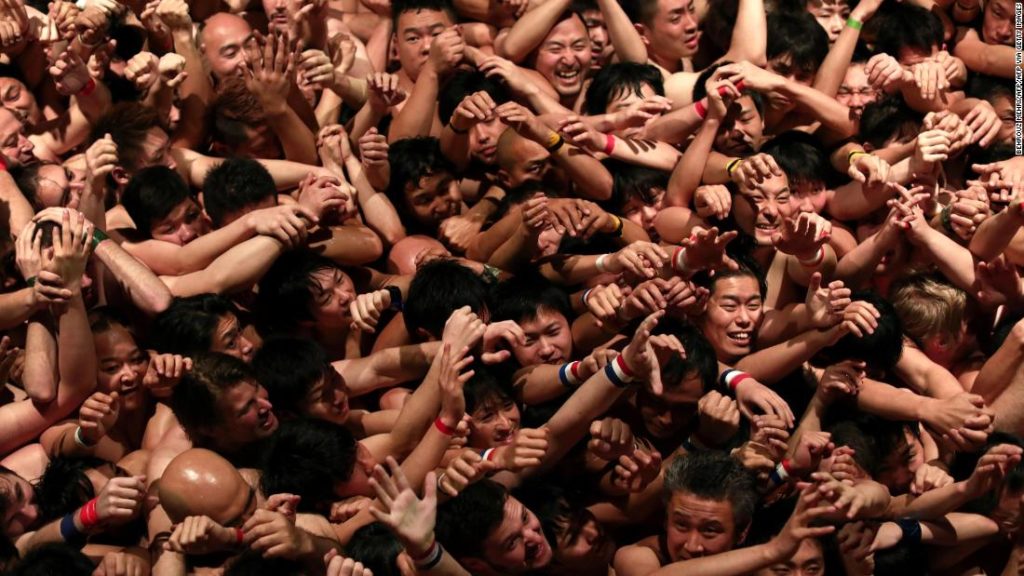(CNN) — This time a year ago, thousands gathered for Japan’s annual Hadaka Matsuri — also popularly known as the “Naked Festival”– in Okayama prefecture in the southern part of Honshu island.
In today’s climate of social distancing, the video highlights from last year’s event (see above) are a surreal reminder of how much has changed since then.
Also known as Saidaiji Eyo, Hadaka Matsuri takes place on the third Saturday of February at the Saidaiji Kannonin Temple, about a 30-minute train ride from Okayama city. And this year was no exception.
But the Covid-19 pandemic has cast its long shadow over 2021 proceedings, forcing organizers to pare things down significantly.
A battle between 10,000 men
Hadaka Matsuri celebrates the blessings of a bountiful harvest, prosperity and fertility.
In normal times, it starts mid-afternoon with an event for young boys — aimed at fostering interest in younger generations. In the evening, the 10,000 or so male participants spend an hour or two running around the temple grounds in preparation and purify themselves with freezing cold water, before cramming themselves into the main temple building.
They aren’t as naked as the festival’s name suggests. They sport a minimal amount of clothing; usually a Japanese loincloth called a “fundoshi” and a pair of white socks called “tabi.”

In this picture taken on February 18, 2017, worshippers wait for the priest to throw the sacred batons during the annual Hadaka Matsuri at Saidaiji Temple in Okayama.
BEHROUZ MEHRI/AFP/AFP via Getty Images
When the lights go out at 10 p.m., a priest throws 100 bundles of twigs and two lucky 20-centimeter-long sacred shingi batons into the crowd from a window four meters above.
It’s a scene that would be unthinkable today. The men, packed in like sardines, jostle with each other to get hold of one of the bundles and/or the two sticks. Whoever succeeds is guaranteed a year of good fortune, according to legend. (The shingi are more sought after than the less-coveted twigs, which can be taken home.)
The whole event lasts around 30 minutes and participants emerge with a few cuts, bruises and sprained joints.
Visitors normally come from all across Japan and a few from abroad to take part.
But event organizers confirmed to CNN Travel that this year’s Hadaka Matsuri event, which took place on February 20, was limited to only a select, socially distanced group of 100 or so men who had caught the shingi in past years, and was closed to spectators.
Rather than battle for the batons, the men gathered at the Saidaiji Kannonin Temple to pray for fertility, an end to the pandemic and world peace, while observing safety measures including social distancing.
Uninterrupted for 500 years

As part of the Naked Festival, participants purify themselves with freezing cold water before entering the main temple.
Trevor Williams/Getty Images AsiaPac/Getty Images
Why not just cancel the entire event?
In a statement highlighting their reasons for going ahead with a severely downsized version of the festival, organizers noted that it’s has continued uninterrupted for over 500 years.
“In discussion with the chief priest and committee members, we have reached the conclusion that we need to pray (for) Eyo now,” said Saijaiji Eyo chairman Minoru Omori. Eyo relates to a term called “ichiyo-raifuku,” which means “to withstand the harsh, cold winter and reach the warmth of spring.”
“In other words, we pray for good luck after continuous bad things,” said Omori.
The Naked Festival evolved from a ritual that started 500 years ago during the Muromachi Period (1338-1573), when villagers competed to grab paper talismans, which were given out by a priest at the Saidaiji Kannonin Temple.
More and more villagers wanted those lucky paper talismans and the ritual grew in size. But they realized that when they went to grab the paper it ripped. Their clothes just got in the way too, so they eventually did away with them and exchanged paper for wood, explained Mieko Itano, a spokeswoman from the Okayama tourism board, in a 2020 interview with CNN Travel.
With its long heritage, the festival was also designated an Important Intangible Folk Cultural Asset in 2016. It’s one of several “naked festivals” held across Japan, with another held at Yotsukaido in Chiba prefecture, featuring men in loincloths fighting and carrying kids through mud as a method of exorcism.
Japan and Covid-19
Daily Covid-19 cases have been in decline in recent weeks in Japan, though Tokyo is among several prefectures under a state of emergency to control the virus. The country has reported more than 424,000 Covid-19 cases and more than 7,000 deaths.
The pandemic forced organizers to postpone the Tokyo 2020 Summer Olympics last year, with the games set to begin on July 23, 2021.
You may also like
-
Afghanistan: Civilian casualties hit record high amid US withdrawal, UN says
-
How Taiwan is trying to defend against a cyber ‘World War III’
-
Pandemic travel news this week: Quarantine escapes and airplane disguises
-
Why would anyone trust Brexit Britain again?
-
Black fungus: A second crisis is killing survivors of India’s worst Covid wave

